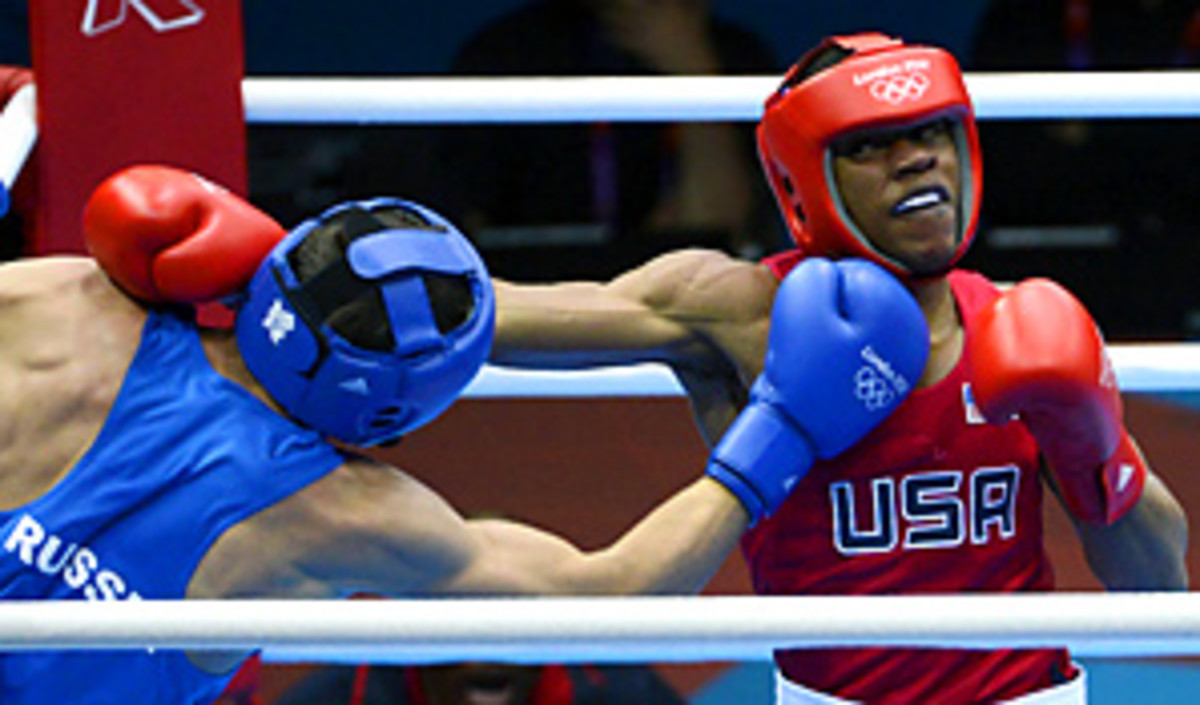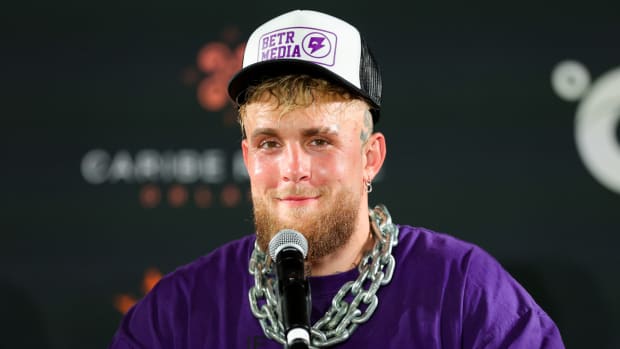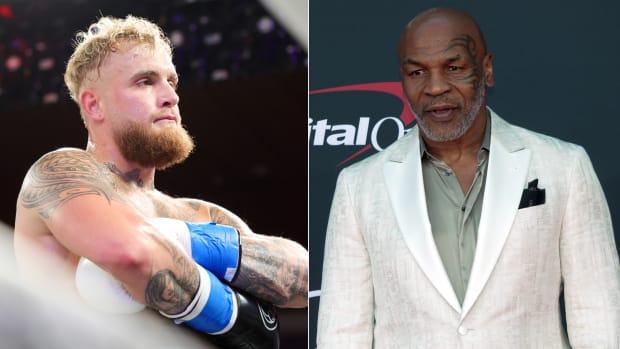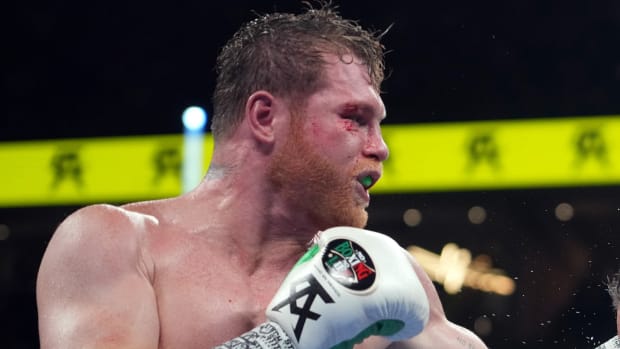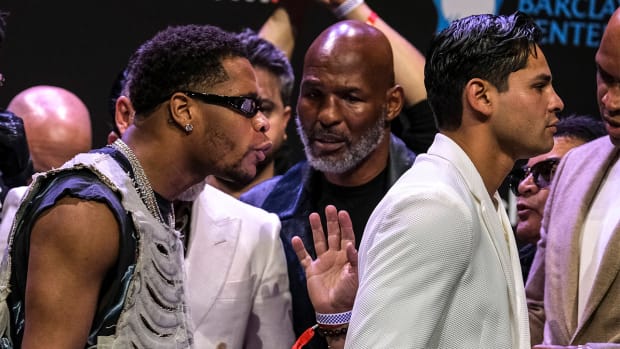USA Boxing has plenty to do after first Olympics without medaling
USA Boxing Executive Director Anthony Bartkowski has been a witness to all of it, one of the many who saw this coming. Last January Bartkowski slipped into a seat for lunch at a Colorado Springs restaurant, an unsettling feeling in his stomach. Two of his dining companions that day -- Alan Ashley, the United States Olympic Committee's Chief of Sport Performance and Rachel Isaacs, the Team Leader of Sport Performance -- were responsible for distributing funds from the USOC's multibillion war chest, and Bartkowski knew they weren't happy. In October, the U.S. was expected to qualify four fighters for the Olympics at the World Championships; they qualified three. That same month the U.S. sent eight fighters to the Pan-American games in Mexico. All eight were eliminated in the first round. "That was as bad a time to have that meeting as it could have possibly been," says Bartkowski. "We were in a tough spot."
Bartkowski feared the USOC would cut his funding; or worse, not fund the boxing program at all. In 2007, USA Boxing received $1.1 million in grants from the USOC, and has been on a precipitous decline ever since. According to USOC tax forms, in 2010 it dipped to $482,000, significantly less than sports like taekwondo ($608,000), curling ($703,000) and biathlon ($922,000) and astronomically less than what speed skating ($2.6 million), bobsled and skeleton ($1.7 million) or gymnastics ($1.6 million) received. The size of a USOC check is based largely on performance and potential, and in its eyes, USA Boxing wasn't showing much of either.
Ultimately, the cut wasn't too deep -- the grant was reduced to $440,000 -- but it came with a condition: Head coach Joe Zanders had to go. It had been a year since Zanders took over the national program and expectations weren't being met. So Zanders resigned in March and was replaced in June by Basheer Abdullah, the Olympic coach in '04, who had less than a month to prepare his team for London. "Obviously," says Abdullah, "it wasn't an ideal situation."
The results have been, well, predictable: Three of the nine U.S. men lost in the first round and only one advanced to the quarterfinals. The first medal-less Olympics in U.S. men's boxing history completed the bottoming out of a once-elite program that amassed a 108 medals between 1904 and 2004 but has collected only one, a bronze in '08, since. Fixing it won't be easy, but there are a few simple places to start.
• Select a coach -- Since 2000, USA Boxing has employed four head coaches, which has created seismic instability in the program. Between 2000 and 2004 the U.S. didn't bother to hire a full-time national coach, instead rotating coaches in annually. "We need to identify a good coach and allow him to have their hands involved with what the team does, starting right after the Olympics," says Bartkowski.
Equally important is putting together a staff with similar philosophies. When heavyweight Deontay Wilder returned from a qualifying tournament in 2007, he told his coach, Jay Dean, that he was taught ten different ways to throw a jab. "It was confusing," says Wilder, a 2008 bronze medalist. "We were trying to learn how to score points and everyone was teaching different ways to throw a punch."
• Incorporatepersonalcoaches -- Standing in a dark hallway beneath the ExCel Exhibition Centre stands last week, Gary Stark Sr., the personal coach for light heavyweight Marcus Browne, fumed. He had just watched Browne drop his first round match, in part, Stark said, because he fought the wrong fight. "Marcus is a power puncher and they have him in there running around," said Stark. "I don't like how they do things here."
Stark crystallized a major problem for the next program: repairing the fractured relationships between personal coaches and USA Boxing. "It's one of the biggest issues we have," says Bartkowski. Personal coaches feel left out of the Olympic process, essentially asked to hand over a fighter they have trained since childhood to a national coach who knows little about them. "I didn't have any part in what went on here," says Armando Mancinas, coach of lightweight Jose Ramirez, "And I didn't like it."
When coaches are shut out, they don't stop coaching -- in Beijing personal coaches were known to train fighters in hotel rooms in the evening -- often forcing an inexperienced athlete to choose between the advice of a coach they trust and the one they are supposed to be working with. In March, the U.S. brought the coaches for the three women Olympians -- Marlen Esparza, Queen Underwood and Claressa Shields -- to a weeklong camp, something Bartkowski hopes to do with the men next year. "We have to get on the same page," says Warren's trainer, Mike Stafford. "What happened [in London] should be an eye-opener. There isn't enough trust between the coaches."
Said Abdullah, "Would it have made a difference if our personal coaches were in the corner? No. They are not familiar with [Olympic] style of boxing. They are not preparing their athletes to box internationally. They are either training them to win on a national level or they are training them to turn pro. We need to put more pressure on our athletes and personal coaches and say, 'Hey, are you going to be part of this amateur program or are you going to go pro?' Choose. If we don't take a stand like that, we'll be right back in the same situation in 2016."
• Meet the World -- Fact: Amateur boxing is nothing like pro boxing. "They are almost different sports," says trainer Freddie Roach. Most American's are trained in a pro-style, which rewards power and aggression, whereas scoring in the computerized points system in amateur boxing requires advanced technique and precision. "This is probably the only sport I know where saying 'our guys train like pros' is a detriment," says trainer Teddy Atlas. "The Olympics does not appreciate that style."
Dual meets, continental competitions and a European tour--which, along with enhanced domestic training, would cost about $750,000 a year--would offer athletes invaluable exposure to a variety of styles. "We can't keep competing against Mexico and Puerto Rico," says Abdullah. "We got to fight more Europeans, more Asians and we have to get in there with the Cubans." Back in the U.S., top international coaches can be imported for seminars on how to counter the styles they will face. "If you fight, you lose and then you go home, what good is it?" asks Atlas. "You're banging your head against the wall. You have to learn ways to beat the guys you are facing."
• Recruit the past -- Imagine, for a moment, if before Ramirez's second round fight he got a pep talk from 1992 gold medalist Oscar De La Hoya. Or if middleweight Terrell Gausha got a couple of tips before his bout from 2000 silver medalist Jermain Taylor. Helpful? Can't hurt. Yet fighters seem to distance themselves from USA Boxing the moment they leave it.
Not all of this is the program's fault. Last week De La Hoya tweeted that the 2016 team should be coached by former Olympians Mark Breland, Sugar Ray Leonard and himself, conveniently omitting the fact that USA Boxing has repeated asked De La Hoya and Leonard to be part of the program and, according to officials, they have repeatedly passed.
USA Boxing needs De La Hoya the fighter, not the coach, the inspiration, not the promoter. De La Hoya's only influence on the 2012 squad came when his company, Golden Boy, issued a news release in July announcing a plan to air U.S. Olympians pro debuts on CBS, a release that enraged AIBA so much that the USOC made all the USA boxers sign waivers affirming they had not signed professional contracts, and left a group of teenagers and 20-somethings wondering if their conversations with Golden Boy had jeopardized their amateur status.
If De La Hoya isn't interested, USA Boxing would benefit from inquiring if others are. The program has churned out some superior talents over the years, from De La Hoya to Floyd Mayweather, from Rocky Juarez to Andre Ward. They don't need to come on as coaches, but some consistent appearances would give everyone a boost.
* * *
Even as USA Boxing sinks to its nadir, there are reasons to be optimistic. For one, fiscal responsibility has been restored. In 2010, Bartkowski inherited a program that had a $1.8 million deficit the year before. In 2011 that deficit was reduced to $313,000 and by the end of this year Bartkowski hopes to have it under six figures. And despite being shut out of a medal, the U.S. qualified fighters in 12 of the 13 weight classes, more than any other country. In the next two months Bartkowski hopes to name an Olympic coach for 2016, so that when he meets with USOC officials in October they will see a stable program worth investing in. "The shape we were in, I knew we were going to have plenty of darts thrown at us," says Bartkowski. "But we came in mid quadrennial and we were faced with so many obstacles. Our eyes are on 2016 and 2020 now. We have a full four-year cycle. Hopefully by the next Olympics, it will be a whole different picture."
